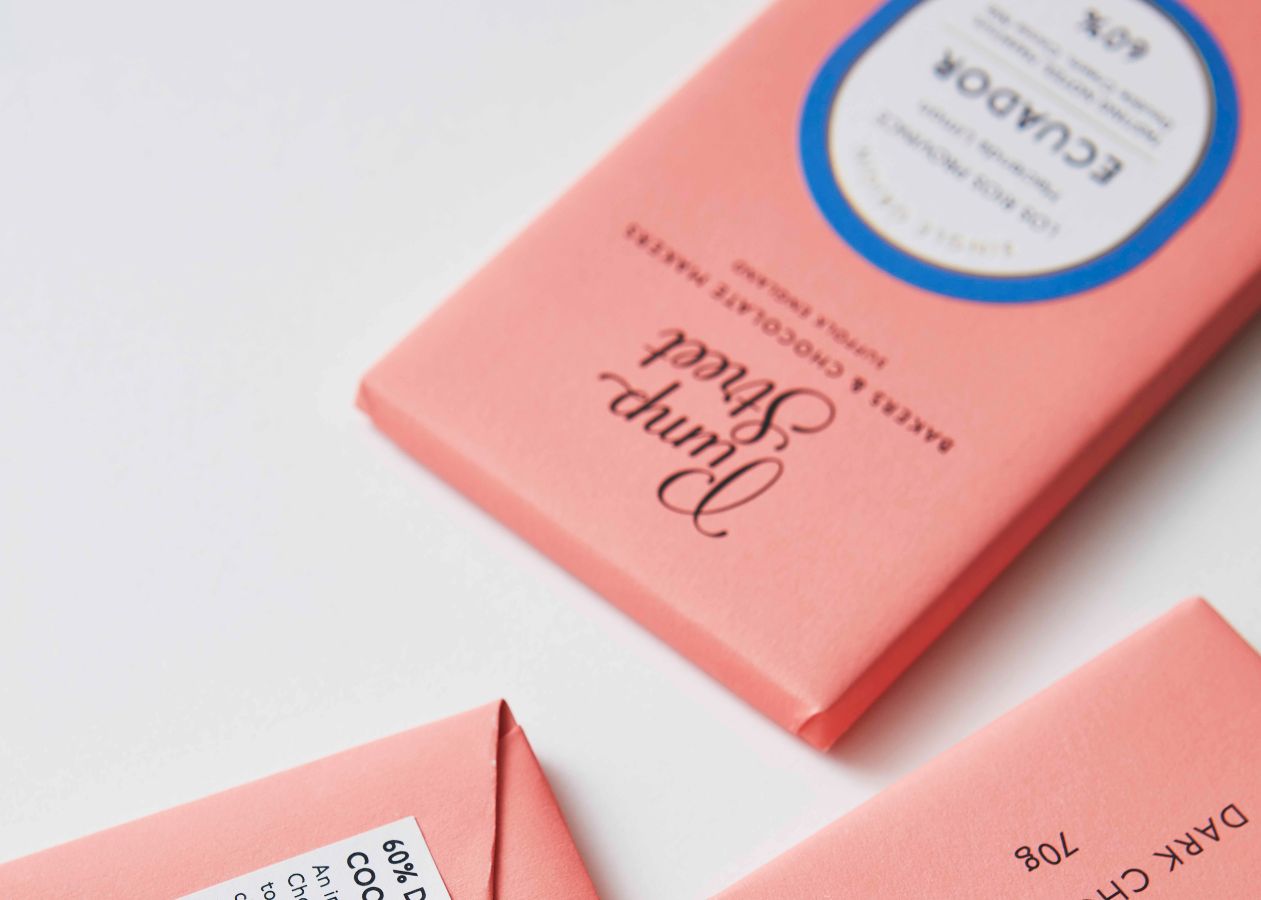SHOP OUR EASTER COLLECTION | FREE DELIVERY ON CHOCOLATE ORDERS OVER £35
SHOP OUR EASTER COLLECTION | FREE DELIVERY ON CHOCOLATE ORDERS OVER £35
SHOP CHOCOLATE
Why we call our chocolate ethical
by Joanna Brennan October 20, 2023 7 min read

Written by Joanna Brennan, director of Pump Street Chocolate
At Pump Street, we take immense care in making sure our chocolate is ethical by our own standards. However, we’re also acutely aware that in the vast world of consumer goods, terms like ‘ethical’ can be thinly defined or morph into buzzwords.
This is our behind-the-scenes glimpse into the heart of our operation, sharing how our commitment to ethics shapes every decision from bean to bar.
It starts with traceability
In our eyes, ethical chocolate starts with the growing, and therefore in order to meet our criteria it must be first and foremost 100% traceable. We couldn't call our chocolate ethical without knowing the origins of our cocoa beans precisely, including the specific farm where the beans were grown and the values upheld by that farm as well as the operational practices employed there.

Ethical chocolate to us then, is chocolate that does right by everyone involved - from the farmers and their communities to the environment and our customers. Our ability to trace the journey of our chocolate from bean to finished bar, and all the important steps in between, embodies our commitment to ethical practices.
And continues with accountability
I hold myself, as director of Pump Street, accountable for the ethical decision making we make as a business and it is my role to drive this forward in a way that fits with our standards.For this reason, we do not currently subscribe to any single external metric for our ethics, but rather we use our own protocols internally to ensure we are continually making the best decisions possible for all the stakeholders involved in our process (namely the farmers, our other suppliers, our team, and the retailers and consumers we serve.)
How do others define ethical chocolate?
While we've shared our perspective on ethical chocolate, it's enlightening to see how others in the industry view this term.
A while back, we had a brilliant conversation with Social Pantry and Jennifer Earle, International Chocolate Judge and founder of London's Chocolate Ecstasy Tours. Jennifer's venture was born out of a desire to demystify the often-elusive world of luxury chocolate, and her tours and workshops look to enlighten chocolate lovers about the tangible value behind ethically-produced chocolates.
In our conversation, Jennifer shared a good piece of advice for those looking to purchase genuinely ethical chocolates. Jennifer pointed out:
“If it’s a multinational brand you recognise, then definitely pass over those. Go beyond the packaging and check the ingredients. Avoid those that include unfamiliar items or seem like cheap fillers, such as palm oil or other vegetable oils. Furthermore, do your homework; visit their website. If a company genuinely practices traceability and sustainability, they will prominently highlight it. It's worth noting that merely being 'Fair Trade' doesn't automatically equate to the highest ethical standards. Fair Trade is commendable, but it doesn’t always measure up to what the some ethical and sustainable companies are accomplishing.” Jennifer Earle
5 reasons we call our chocolate ethical
All Our Cocoa Beans are Traceable and Responsibly Sourced
The global chocolate industry sadly has a long history of deeply unethical practices. The inequities in the system are complex but it is certain that they have been perpetuated by lack of traceability and transparency within the cocoa supply chain.
For example, industrial chocolate makers source on a scale so vast that it necessitates many layers of middle men between them, the traders and the growers, harvesters, and the cocoa processing at origin.This lack of transparency is dangerous in that it can conceal unjust labour practices - creating a veil of anonymity that the largest makers have hidden behind for years.
Some have begun to say that they will tackle these systemic issues, but action has been slow. Read more from this special report on child labour in the chocolate industry from the Financial Times.
At Pump Street, we stand against this by ensuring traceability right down to the farm level. Here’s exactly how we make sure our beans are traceable and responsibly sourced:
-
Direct relationships with our farmers: We source our cocoa beans from farmers we know and can communicate with directly. And when a language or structural barrier to trade does exist, we use the help of a single intermediary. This approach is rooted in our single origin, single farm philosophy. It’s something that not only facilitates direct relationships but also allows us to understand the intricacies of each farm — from their operational practices to their labour conditions. For more information into the stories of our partnered farms and their unique origins, you can exploreour origins page.
-
Transparent labelling on our bars: Each bar we make carries a label on the front, declaring the country of origin, and the name of the farm where the cocoa beans were grown. For bars without inclusions we include the region also. On the back of the bars you will find the crop year of the beans it was made with, as well as the batch code which traces every sack of beans through to the finished bar. Our transparent labelling serves as a clear, traceable link for our customers, leading them back to the very farm that grew the chocolate they are holding. We want to replace the supply chain anonymity that’s often seen in the industry, with something far more accountable.

We Ensure Fair Prices for Our Farmers
Our direct trade approach means we buy our chocolate directly from the farmers (or via one intermediary when absolutely necessary due to language or trade barriers) and that they are the ones that set the prices of the beans.
The commodity price of cocoa varies daily, but since we started making chocolate in 2013 it has stayed mostly in the $1500-2500 per MT (metric ton) range, recently rising about $3000 per MT. This is the price that commodity cocoa is traded and is indicative of what is paid by industrial chocolate makers. For Fairtrade cocoa, a premium is paid which means that an extra $200 over the commodity price, is given to a cooperative of farmers who have become certified together. This money is then ring fenced and they must decide together what to use it for.
To generalise wildly, for an industry that spans the globe - many small farmers’ route to the commodity market is to sell their wet cocoa on to a middle man who will then sell it on to someone who will ferment and dry it and then an exporter will sell it out of the country or origin. Sometimes most of the steps in this process are taken on by a national cocoa board, which is often a vestige of a colonial system that served originally to take commodities from colonies to other markets for the profit of those in power. Today, cocoa boards’ role is debated and their impact must be assessed on a case by case basis - see events such as: Assessing the effectiveness of services provided by Cocoa Board (COCOBOD): Ghana's success story.
By bypassing cocoa boards and layers of middlemen and disregarding the commodity price of cocoa we hope to pay farmers what they want and need in order to run their own businesses with autonomy and power. While we believe that the Fairtrade goals are the same as ours, the method of getting extra money into the hands of the growers is, we believe, too limiting and top-down to allow farmers the autonomy, respect and ultimately the financial freedom to make the decisions needed for their own businesses.

We’re Careful in Sourcing All Our Ingredients
Cocoa, sugar, salt, every ingredient matters and every ingredient contributes to the ethics of our chocolate bars. We’ve talked a lot about our cocoa. But what about the other ingredients we use, and the ones we purposefully leave out?
Sugar is our second most used ingredient by weight. We made a purposeful decision to use cane sugar instead of British-grown beet sugar because the flavour of cane sugar is so clean and pure and is more traditional in chocolate. While the cane sugar farming and refining system is problematic in many of the same ways that the cocoa system is, we have yet to find a small scale refinery that can offer us traceability and refined sugar for our chocolate, though we are constantly on the lookout for one.
By marrying our bakery and chocolate-making endeavours, we’ve also created a low-waste model that reincorporates would-be waste materials back into our products, and ensures that the deep level of knowledge we have about the ingredients in our chocolate extends to all the ingredients in the inclusions we use, too.
We have been working on seeking a higher quality, more traceable milk powder supply and we have found our best one yet with the milk powder that are sourcing from Switzerland. The Swiss dairy regulations are the most stringent in the world and this roller-dried whole milk powder retains as much of the flavour and goodness of the milk as possible in the drying process.
We’ll never use any non-cocoa derived fats, such as vegetable oils or palm oils, nor ultra-processed ingredients such as lecithins or other emulsifiers.
Our Packaging Decisions Are Mindful
Our approach to packaging is simple. The packaging should do the job it needs to do, to transport the food safely to you, the consumer, while explaining what is inside the packaging both in factual and more broad terms such as displaying the care and attention we put into all of what we do.
At the same time, ideally it will leave almost no trace. Every time we create a new product we think as one of our first steps - is this something that we will be able to package in recyclable materials? If not, we won’t make it.
All of our packaging is either fully recyclable or home compostable and we will always explain how to dispose of it in the most sustainable way on the pack itself.

We Pursue Continuous Improvement to Evolve with the Times
Our quest to be truly ethical doesn't have an endpoint. We're continually seeking ways to better our practices, to make a more significant impact, and to genuinely live up to the title of an 'ethical chocolate company'.
In our quest for continuous improvement, we are currently looking at improving the following:
-
Improving our relationships with farmers by sharing more information.
-
Sourcing a more traceable sugar.
-
Being more transparent externally with the prices we pay for cocoa.
If you are interested about all the farms we work with, visit our Origins page where you can shop our single farm chocolate by origin.
Subscribe
Sign up to get the latest on sales, new releases and more …


